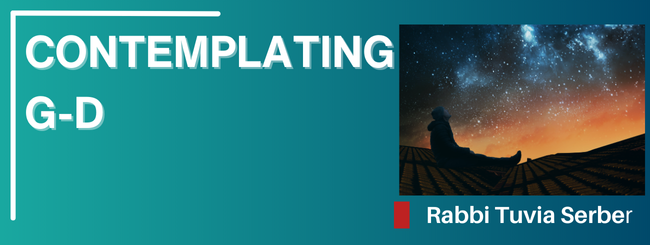בס”ד
.
A Summary of the class
1. What Does Contemplation Really Mean?
To contemplate means to think deeply and consciously—especially about G-d. Not just a quick thought, but true reflection, emotion, and returning to the idea again and again. In Judaism, this is not reserved for mystics, but is a core spiritual practice.
It’s not just “I believe in G-d” and move on — it’s about slowing down, focusing, and letting it change you.
2. Is This Uniquely Jewish?
Absolutely. While “meditation” is often associated with Eastern traditions, Judaism has its own ancient practice of contemplation, rooted in Torah, halacha, and the teachings of Chassidut. It applies to both Jews and non-Jews, each in their own way.
3. A Personal Relationship With G-d
Everyone has their own unique relationship with G-d, shaped by their personality, life stage, and experience. Even though there are fixed commandments (613 for Jews, 7 Noahide laws for non-Jews), the inner spiritual journey is deeply personal.
4. How to Start Contemplating
Start small.
Take just 15 seconds a day to think deeply about one idea—like G-d’s greatness or the beauty of creation. Use a timer if needed. Then slowly build to 20 or 30 seconds.
It’s not about the time you spend—it’s about the depth and clarity of your focus.
5. When to Contemplate
Classic Jewish sources give clear guidance:
- Before prayer – The Shulchan Aruch says you should prepare your heart before standing before the King of Kings.
- To develop love and awe of G-d – Maimonides (Rambam) teaches in Yesodei HaTorah that true love and awe of God come only through reflection and understanding.
6. What Should You Think About?
Start with simple things in the world around you:
- The sun rising
- The human body and its systems
- Trees, stars, wind, water
- Your breath, your life
As in Psalms 8:4 : “When I behold Your heavens, the work of Your fingers…”
Nature is a doorway to wonder — if we stop and notice.
7. A Classic Jewish Work: Duties of the Heart
In Chovot HaLevavot, Rabbi Bahya ibn Paquda (11th century) explains that many people don’t contemplate because they’re distracted by the physical world.
He writes: “Even the stones beneath your feet ask—Why do you step on me? I’m doing my job. Are you doing yours?”
8. The Structure of the Mind According to Chassidut
Our mind works in three main stages:
- Chokhmah (Wisdom) – the first flash of insight
- Binah (Understanding) – developing and analyzing the idea
- Da’at (Connection) – emotionally internalizing the idea so it moves you
We use this same process to contemplate G-d:
- “G-d is great.” (Chokhmah)
- “Why? What has He done?” (Binah)
- “What does this mean for me?” (Da’at)
The deeper the understanding, the deeper the feeling.
9. Why Is G-d So Great?
It’s not just that He created the universe — it’s how.
Our sages teach that G-d created this entire world with just one Hebrew letter: hei.
The next world? He created it with the letter yud.
In other words: what we see as G-d’s greatness, is just His humility. Creation is only the beginning — not even a fraction of His true essence.
10. Why It All Matters
Contemplation transforms us. It turns prayer into a real connection, deepens our understanding of life, and reminds us we’re part of something greater. And it doesn’t start with more study — it starts with focused, heartfelt thought.
Final Thoughts
Contemplation is:
- Deeply Jewish
- Practical
- Personal
- Transformational
Start small. Stay steady. Think deeply.
And ask yourself:
Am I thinking about G-d today — or just cake?
By Rabbi Tuvia Serber
More shiurim of Rabbi Tuvia Serber
© Copyright, all rights reserved. If you enjoyed this article, we encourage you to distribute it further.
Our blogs may contain text/quotes/references/links that include copyright material of Mechon-Mamre.org, Aish.com, Sefaria.org, Chabad.org, and/or AskNoah.org, which we use in accordance with their policies.
